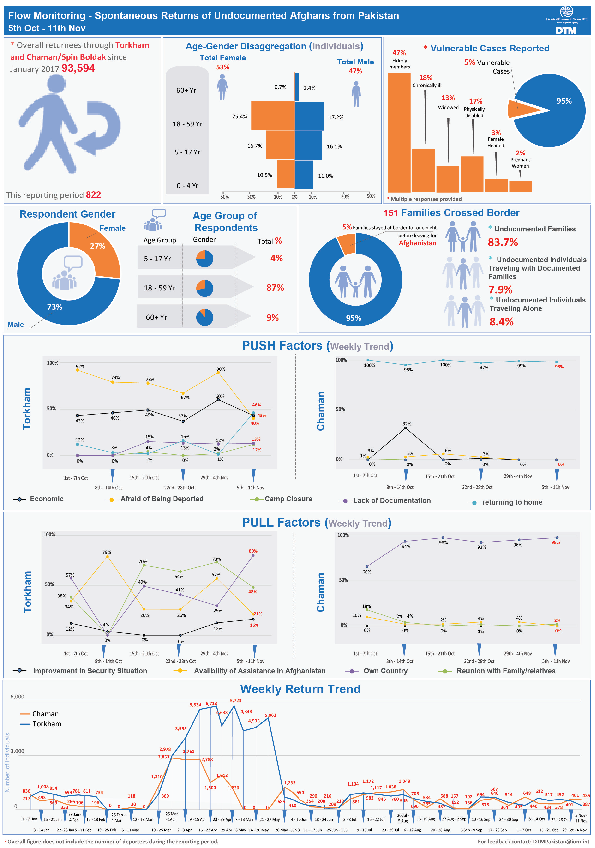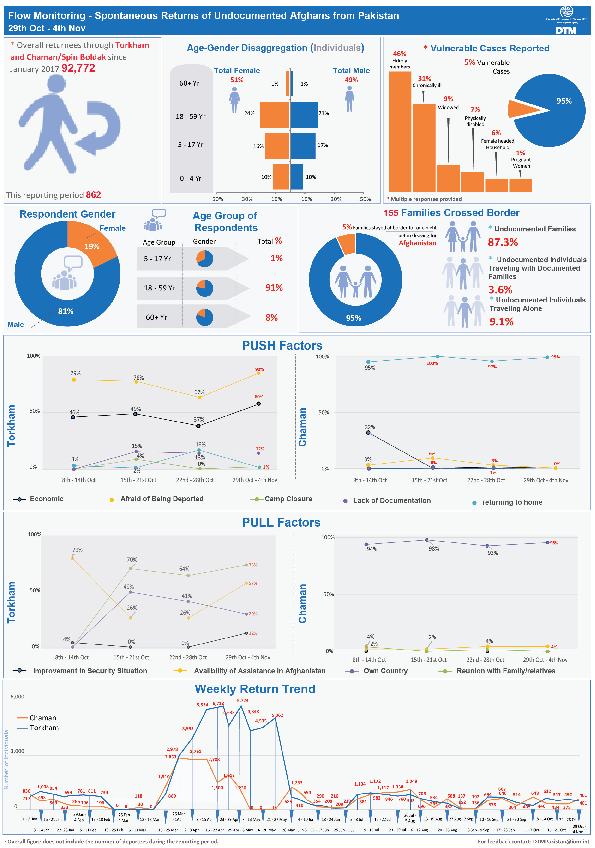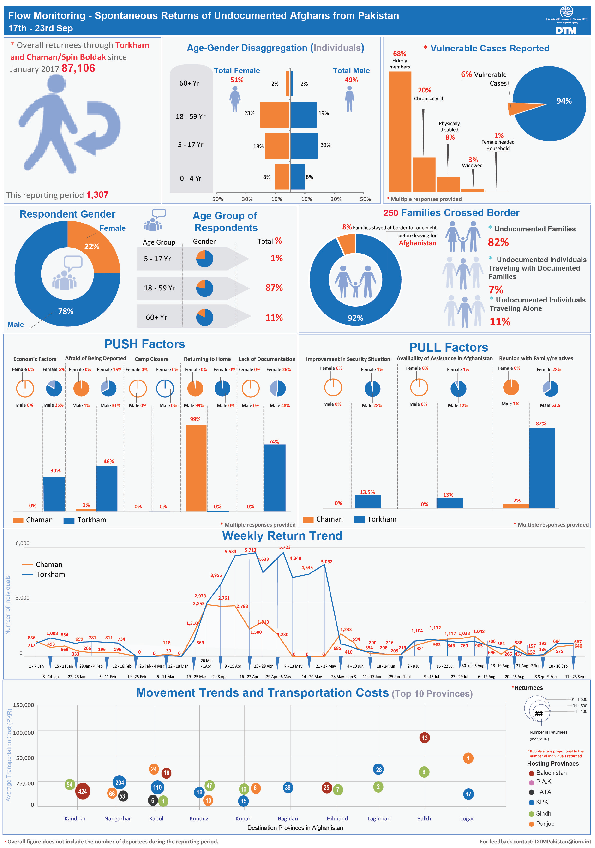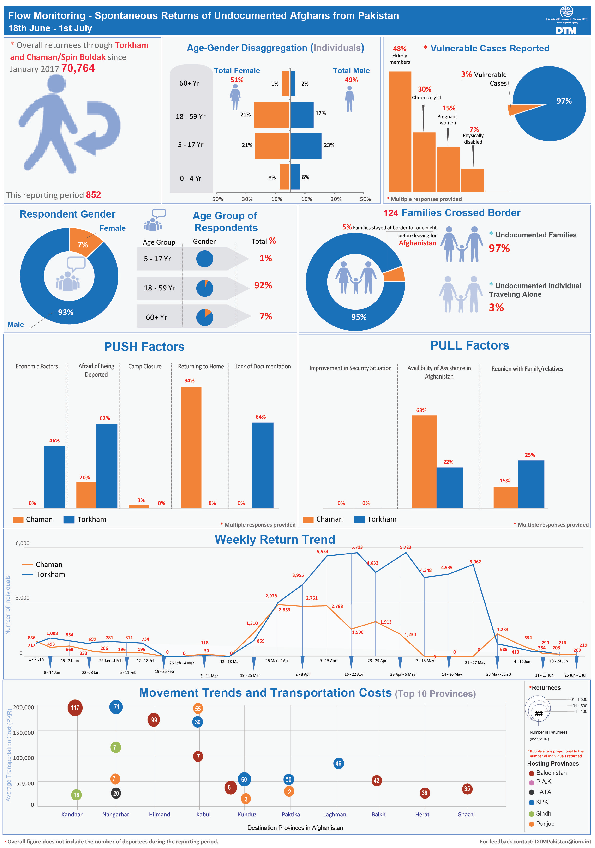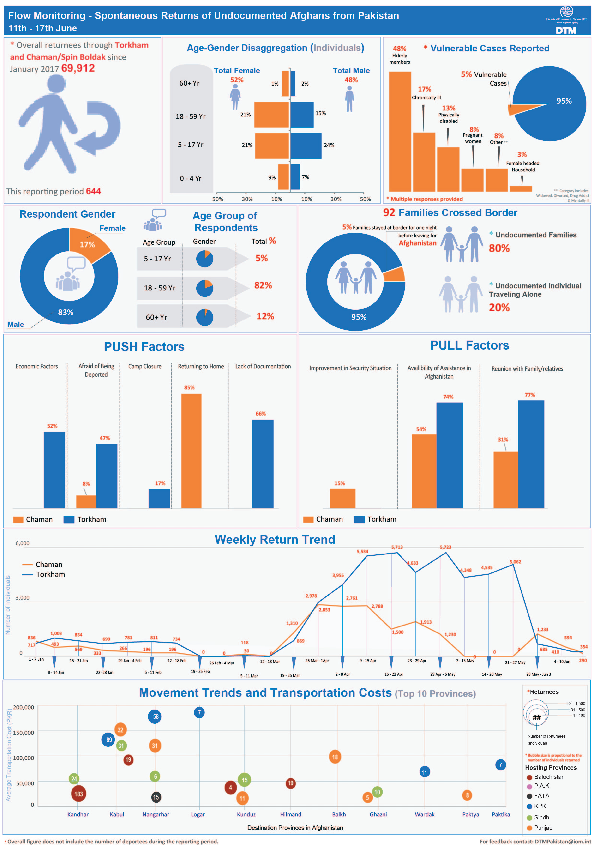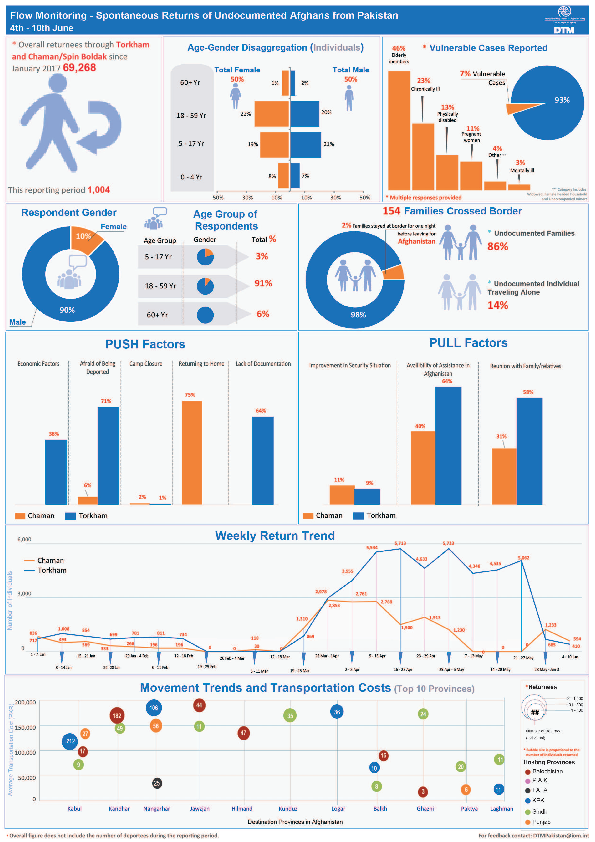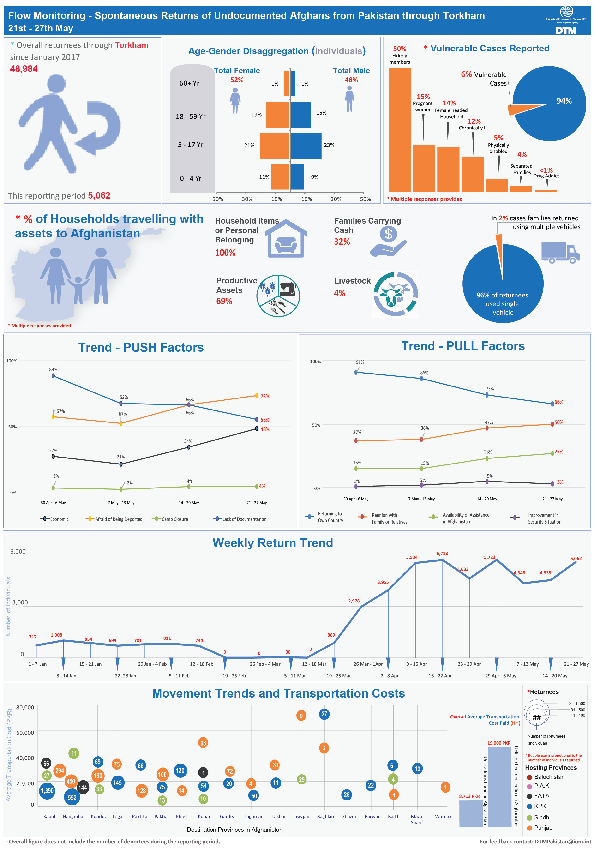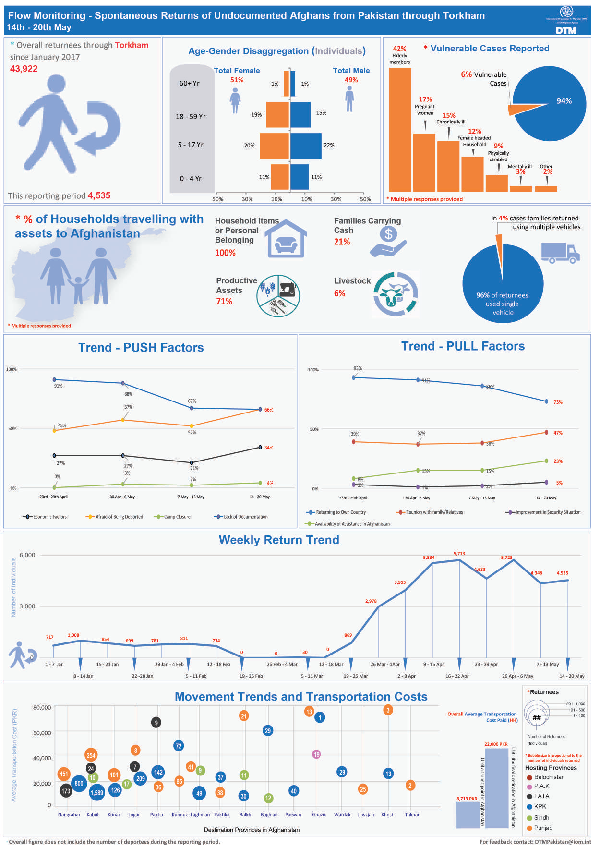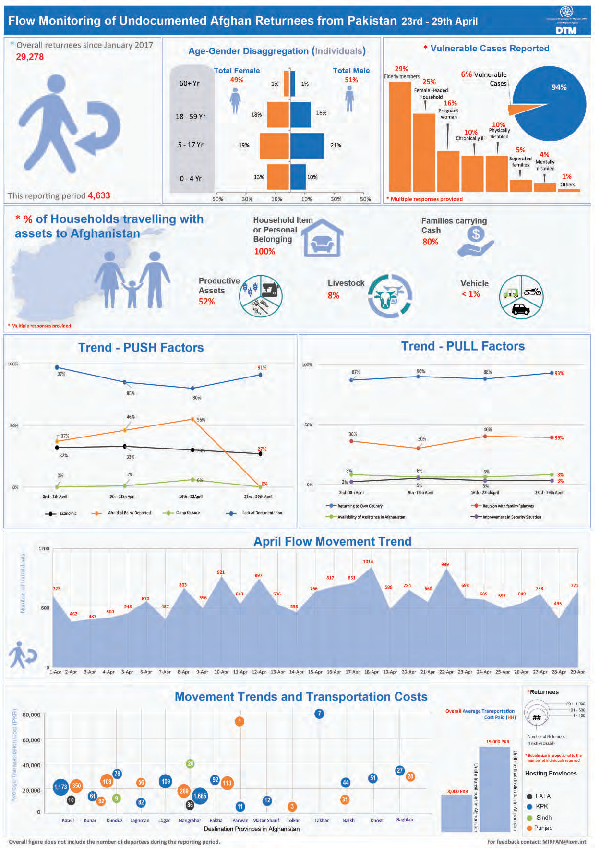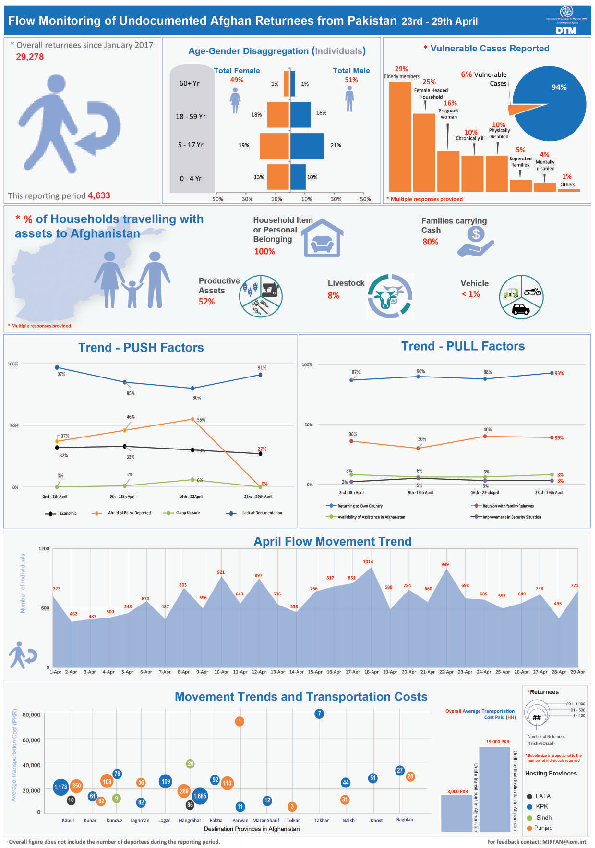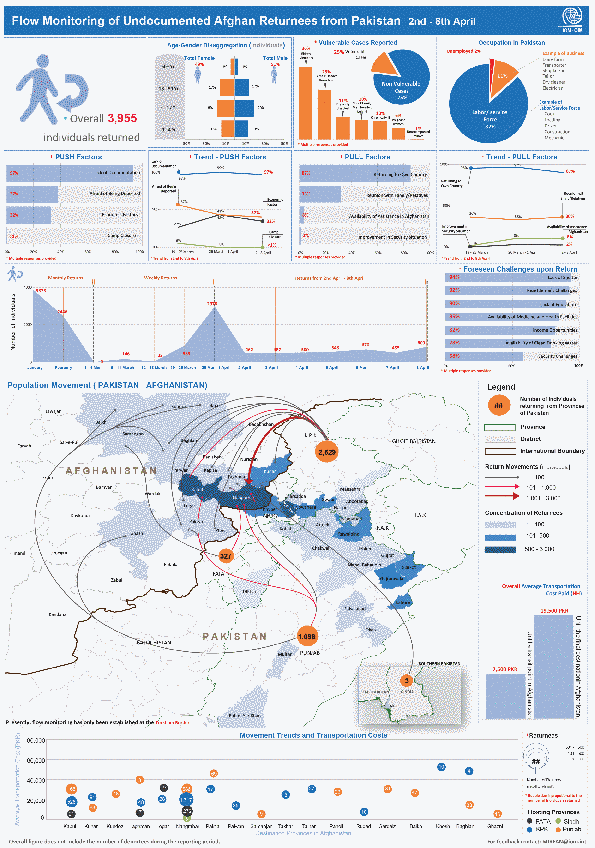-
Countries
-
Data and Analysis
-
Special Focus
-
Crisis Responses
Pakistan
Pakistan
TDPs tracked
Displacement Movements
21,000
IDMC 2022
Data collection round
About Pakistan
In 2010, IOM’s Displacement Tracking Matrix (DTM) programme started its activities in Pakistan as part of IOM’s emergency flood response programme. Over the years, DTM has evolved into a comprehensive programme covering a wide range of activities. The DTM programme works closely together with a wide array of stakeholders, including government ministries and national and sub-national statistical organizations, UN agencies, and specialized research institutes. Its activities are instrumental in providing stakeholders with an evidence-base to effectively address humanitarian, transition, and development needs within the country.
In 2017, DTM started the implementation of its Flow Monitoring (FM) activities. DTM collects FM data at the Torkham (Khyber Pakthunkhwa), Chaman, Badini and Bahramcha (Balochistan) border crossing points (BCPs) to identify cross-mobility patterns and profiles of Afghans who are returning from Pakistan to Afghanistan. The data presented in FM information products is harmonized with those from the United Nations High Commissioner for Refugees (UNHCR), who also cover Ghulam Khan (Khyber Pakhtunkhwa). DTM Pakistan also actively coordinates its data collection efforts with the DTM programme in Afghanistan.
As part of the 2022 flood response, DTM launched mobility tracking operations in flood-affected settlements or settlements that hosted temporary displaced persons (TDPs) across 11 districts in Balochistan and Sindh to provide partners with timely information on the displacement situation. Since then, DTM’s mobility tracking has expanded to cover 30 districts across three provinces (Balochistan, Sindh and Khyber Pakhtunkhwa) and collects information on the multisectoral needs and recovery needs at the settlement level, in addition to the displacement situation.
In May 2023, DTM scaled-up its mobility tracking efforts to support the ongoing response efforts for Afghans in Pakistan. DTM’s Afghan response has been implemented in 33 districts across Balochistan, Khyber Pakhtunkhwa, Islamabad, Punjab, and Sindh, and aims to provide stakeholders with up-to-date information on the multisectoral needs of Afghans in the country.
Furthermore, under the European funded project “Displacement Tracking Matrix Regional Evidence for Migration Analysis and Policy (DTM REMAP), from 2019 to 2022, DTM implemented two household surveys. The first survey was the survey on Drivers of Migration (SDM) which aimed at better understanding the drivers of Pakistani international out-migration. The second survey was the “Returnee Longitudinal Survey (RLS)”. The purpose of RLS was to improve understanding of return migrants’ profiles, vulnerabilities and needs, as well as sustainable return and reintegration outcomes in the short- and medium-term.
Contact
DTM Pakistan
DTMPakistan@iom.int
Current Donors
- EU-INTPA
- ECHO
- Ministry of Foreign Affairs of Italy
- PRM
- Canada – IRCC
- Canada (DFATD)
- Netherlands
Pakistan — Flow Monitoring of Undocumented Afghan Returnees from Pakistan (5—11 November 2017)
Since January 2017, overall, 93,594 returnees have been reported returning through Torkham and Chaman/Spin Boldak. Between 5-11 November, 822 returnees were recorded. Main push factors are returning to home and economic, while the main pull factor was returning to own country.
Pakistan — Flow Monitoring of Undocumented Afghan Returnees from Pakistan (29 October — 4 November 2017)
Since January 2017, overall, 92,722 returnees have been reported returning through Torkham and Chaman/Spin Boldak. Between 29 October and 4 November, 862 returnees were recorded.
Pakistan — Flow Monitoring of Undocumented Afghan Returnees from Pakistan (8—14 October 2017)
Since January 2017, overall, 90,089 returnees have been reported returning through Torkham and Chaman/Spin Boldak. Between 8—14 October, 1,052 returnees were recorded. Main push factor In Torkham is fear of deportation, while the main push factor In Chaman was returning home.
Pakistan — Flow Monitoring of Undocumented Afghan Returnees from Pakistan (15—21 October 2017)
Since January 2017, overall, 91,040 returnees have been reported returning through Torkham and Chaman/Spin Boldak. Between 15—21 October, 951 returnees were recorded. Main push factor in Torkham was fear of being deported while the main push factor in Chaman was returning home.
Pakistan — Flow Monitoring of Undocumented Afghan Returnees from Pakistan (17—23 September 2017)
Since January 2017, overall, 87,190 returnees have been reported returning through Torkham and Chaman/Spin Boldak. Between 17—23 September, 1,307 returnees were recorded.
Pakistan — Flow Monitoring of Undocumented Afghan Returnees from Pakistan (13-19 August 2017)
584 undocumented Afghan individuals returned to Afghanistan through the Torkham border crossing whilst 265 individuals used the Chaman/Spin Boldak border crossing, bringing the total number of returns this week to 849 (144 families). This is an approximate 39% decrease as compared to last week.
Pakistan — Flow Monitoring of Undocumented Afghan Returnees from Pakistan (6–12 August 2017)
1,402 Undocumented Afghan individuals returned to Afghanistan through the Torkham and the Chaman/Spin Boldak border crossing during the reporting period bringing the overall number of returnees since January 2017 to 82,019 individuals.
Pakistan — Flow Monitoring of Undocumented Afghan Returnees from Pakistan (30 July — 5 August 2017)
905 Undocumented Afghan individuals returned to Afghanistan through the Torkham border crossing whilst 1,048 individuals used the Chaman/Spin Boldak border crossing, bringing the total number of returns this week to 1,953 (323 families).
Pakistan — Flow Monitoring of Undocumented Afghan Returnees from Pakistan (23—29 July 2017)
During the reporting period 1,798 undocumented Afghan returnees were identified through Torkham and Chaman/Spin Boldak. Thus far in 2017 78,664 Afghan returneed have been identified through the above-mentioned locations.
Pakistan – Flow Monitoring of Undocumented Afghan Returnees from Pakistan (16 — 22 July 2017)
846 Undocumented Afghan individuals returned to Afghanistan through the Torkham border crossing whilst 1,117 individuals used the Chaman/Spin Boldak border crossing, bringing the total number of returns this week to 1,963 (315 families).
Pakistan – Flow Monitoring of Undocumented Afghan Returnees from Pakistan (9—15 July 2017)
1,172 Undocumented Afghan individuals returned to Afghanistan through the Torkham border crossing whilst 982 individuals used the Chaman/Spin Boldak border crossing, bringing the total number of returns this week to 2,154 (337 families).
Pakistan – Flow Monitoring of Undocumented Afghan Returnees from Pakistan (18 June — 1 July 2017)
The overall returnees through Torkham and Chaman during this reporting period were 852 individuals. Of these 51% were female and 49% were male. 44% were between 5 and 17 years old. 38% were between 18 and 59 years old.
Pakistan – Flow Monitoring of Undocumented Afghan Returnees from Pakistan (11—17 June 2017)
During the reporting period, DTM identified a total of 644 undocumented Afghans who had returned from Pakistan through the Torkham border. DTM has identified 69,912 returnees since January 2017.
Pakistan — Return of Undocumented Afghans from Pakistan (4—10 June 2017)
During the reporting period, DTM identified a total of 1,004 undocumented Afghans who had returned from Pakistan through the Torkham border. DTM has identified 69,268 returnees since January 2017.
Pakistan — Flow Monitoring Return of Undocumented Afghans from Pakistan (28 May — 3 June 2017)
DTM identified 685 undocumented Afghans returning from pakistan through Torkham during this reporting period.
Pakistan — Return of Undocumented Afghans from Pakistan (21—27 May 2017)
During the reporting period, DTM identified a total of 5,062 undocumented Afghans who had returned from Pakistan through the Torkham border. DTM has identified 48,984 returnees since January 2017.
Pakistan — Return of Undocumented Afghans from Pakistan (14 — 20 May 2017)
Durning this reporting period DTM indentified 4,535 undocumented Afghan returnees through Torkham. Of the total identified population 51% are female and 49% are male.
Pakistan — Flow Monitoring of Undocumented Afghan Returnees from Pakistan (23 – 29 April 2017)
DTM recorded 29,278 returnees since January 2017. The report further details age and gender disaggregation, recorded vulnerable cases, information on households travelling with assets to Afghanistan, push and pull factor trends and movement trends and transportation costs.
Pakistan — Flow Monitoring of Undocumented Afghan Returnees from Pakistan (7—13 May 2017)
IOM Pakistan’s Weekly Situation Report on the Return of Undocumented Afghans through the Torkham border during the reporting period of 7th - 13th May 2017.
Pakistan — Flow Monitoring of Undocumented Afghan Returnees from Pakistan (30 April —6 May 2017)
IOM Pakistan’s Weekly Situation Report on the Return of Undocumented Afghans through the Torkham border during the reporting period 30th April - 6th May 2017.
Pakistan — Flow Monitoring of Undocumented Afghan Returnees from Pakistan (23—29 April 2017)
IOM Pakistan’s Weekly Situation Report on the Return of Undocumented Afghans through the Torkham border during the reporting period of 23rd – 29th April 2017.
Pakistan — Flow Monitoring of Undocumented Afghan Returnees from Pakistan (16—22 April 2017)
IOM Pakistan’s Weekly Situation Report on the Return of Undocumented Afghans through the Torkham border, reporting period [16th - 22th April 2017].
Pakistan — Flow Monitoring of Undocumented Afghan Returnees from Pakistan (9- 15 April 2017)
IOM Pakistan’s Weekly Situation Report on the Return of Undocumented Afghans through the Torkham border, reporting period [9th - 15th April 2017].
Pakistan — Flow Monitoring of Undocumented Afghan Returnees from Pakistan (2—8 April 2017)
IOM Pakistan’s Weekly Situation Report on the Return of Undocumented Afghans through the Torkham border, reporting period [2nd - 8th April 2017].


